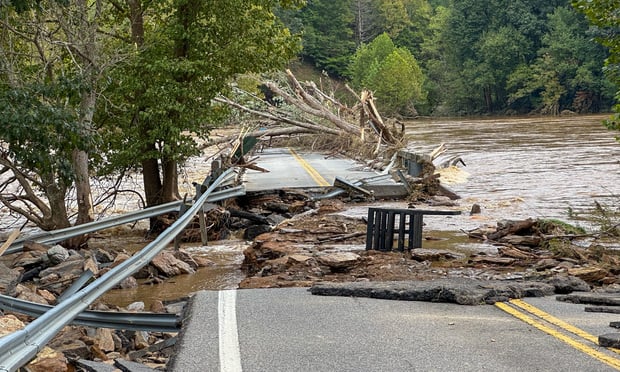The first post-Katrina trial over the flood exclusion in a homeowners policy ended with insurance groups proclaiming victory last week. U.S. District Judge L.T. Senter ruled that the great majority of damage to a Mississippi home was caused by flood, and therefore was not covered under the terms of a homeowner policy written by Nationwide Mutual Insurance Company.
"There is no evidence to support the finding that this insurance contract should be reformed," wrote Judge Senter in his opinion in the bench trial of Paul Leonard and Julie Leonard vs. Nationwide.
The law firm of Richard Scruggs, a well-known plaintiffs' attorney, represented Pascagoula residents Paul and Julie Leonard in their case, contending that wind-driven rain--and not flooding--from Hurricane Katrina caused most of the damage to their home, and was therefore covered under the terms of their homeowners' policy.
The judge wrote that since the Leonards had read the copy of the policy, "they were bound by the express terms of the policy, even if their interpretation of the policy was incorrect, and even if the inferences they drew from the conversations they had with [Nationwide Insurance agent Jay] Fletcher were erroneous."
Mr. Fletcher was originally named in the suit, as it was first alleged that he told the couple they did not need to purchase flood insurance because they were covered for hurricanes and resulting storm surge. (See related story, linked below.)
But in the end it was the judge's contention that virtually all of the damage to the Leonards' home was caused by an incursion of water validly excluded under the terms of their policy that carried the day for Nationwide and the industry.
Insurance industry representatives expressed satisfaction that a federal judge has upheld the sanctity of the flood exclusion.
Ernie Csiszar, president of the Property Casualty Insurers Association of America headquartered in Des Plaines, Ill., said the judge's ruling made it clear that the flood exclusion applies to storm surge.
"In the insurance coverage debate over wind vs. water, Judge Senter's ruling has taken much of the wind--literally and figuratively--out of the plaintiff's attorney's argument," Mr. Csiszar said in a statement.
Cecil Pearce, vice president of the Washington-based American Insurance Association, said in a statement that the decision is a "significant step forward for insurers and others committed to rebuilding after Katrina."
But Mr. Pearce added that the industry could still face challenges. "Each case is different, involving different fact patterns and different levels and types of coverage that apply to each policyholder," he said.
Vince Vitkowsky, a New York-based insurance attorney with the firm of Edwards Angell Palmer & Dodge, said he was particularly impressed with the judge's ruling in terms of how fact-specific it was. For example, his specific apportionment of cleanup damages based on the water line of the house indicated the judge's pure reliance on fact testimony.
Neal Alldredge, senior vice president for the National Association of Mutual Insurance Companies in Indianapolis, Ind., pointed out that "all of the individual experts were 'qualified' to express the opinions they rendered and none of the expert testimony was stricken."
A future challenge for the industry will come in Mississippi state court, where Attorney General Jim Hood is suing several insurers claiming their policy language is ambiguous and that wherever ambiguity exists it should be interpreted in favor of the policyholder.
"I think this [Judge Senter's decision] will do some damage to that," Mr. Alldredge told the National Underwriter.
Indeed, the one straw the plaintiffs could grab from the Leonard case was Judge Senter's contention the insurer could not deny coverage for wind damage when it occurred in combination with flooding.
In his ruling, the judge called the provision in the Nationwide contract that cancels coverage for wind damage if it takes place at the same time an excluded peril also causes damage ambiguous. But he also noted that Nationwide did not invoke this clause in its denial of the bulk of the Leonard claim.
Robert Hartwig, chief economist for the Insurance Information Institute in New York, said Nationwide's action in regard to the so-called anticoncurrent clause makes it a non-issue. Nonetheless, he said the judge's points in the ruling could make the clause subject for further judicial review.
In a written statement, Nationwide said it was pleased with the decision and would "continue to adjust claims on a case-by-case basis."
"While it is unfortunate that the Leonards did not choose to purchase flood coverage, insurance carriers have an obligation on behalf of all policyholders to adjust claims based on factual evidence that supports coverage payments," the statement said.
Plaintiffs' attorneys Richard Scruggs and his son, Zach Scruggs, could not be reached by National Underwriter for comment.
Industry representatives took issue with Richard Scruggs' widely reported post-verdict remark that the judge left "the groundwork for homeowners to do very well" in other cases with his reference to the ambiguity of some of the Nationwide clauses dealing with concurrent causation.
Marsha Harrison, NAMIC counsel, said that since most companies would probably follow Nationwide's lead in not invoking the clause, there will probably not be much impact from the judge's comments related to concurrent causation.
"I think Mr. Scruggs is just trying to salvage something from the case," she said.
While the Leonards had claimed an estimated $130,000 in damages, Nationwide paid $1,661, and the judge's ruling added $1,228 to the payment for additional wind damage.
The judge rejected the contention in other cases, particularly in the lawsuit brought by Attorney General Jim Hood against several insurers in state court, that storm surge is essentially wind- and not flood-driven damage.
"Storm surge is a type of flooding that is covered by flood policies sold under the National Flood Insurance Program and excluded under standard homeowners policies," the judge wrote in the Leonard decision.
Mr. Hartwig said the judge's ruling that most of the damage to the Leonard home was associated with an excluded peril means that "the vast majority of such litigation coming down the pike has now become uneconomical, and in my opinion unlikely to enter the court system."
Additional litigation was very much on the mind of Judge Senter when he sent a letter to 180 lawyers involved in the Mississippi hurricane litigation last week to see how the cases could be resolved quickly.
The Scruggs firm represents about 3,000 cases, and Richard Scruggs had suggested earlier that representative policyholders could be selected for trials.
The judge set an August 25th date for receiving suggestions.
Insurance executives expressed skepticism about such representative trials, especially with all the comments dealing with the need to treat each claim on a case-by-case basis. But they understand there is a need to conclude them as quickly as possible.
"While representative trials may be a nonstarter for insurers, there may be other approaches that insurers could suggest that get us to the same goal of equitably and efficiently dealing with the court's Katrina caseload," said Julie Pulliam, a spokesperson for the American Insurance Association.
Mr. Vitkowsky said the judge's letter indicated that while there may be specific factual differences in each case, "there is also a great deal of commonality."
"For example, the homes in that neighborhood probably underwent a similar experience," he said. "So it might be appropriate in a particular instance, but I don't think it would be appropriate to combine everything."
The judge's denial of class action status for another aggrieved Mississippi owner would seem to indicate the difficulty of bundling these cases. The attorney for Judy Guice hoped to lump all State Farm claims for full damages where wind and water damages could not be separated.
"The nature and extent of property damage the owners sustain from the common cause, Hurricane Katrina, will vary greatly in particulars, depending on the location of the property before the storm struck and depending also on what combination of forces caused the damage," Judge Senter wrote in the Guice ruling last week.
Want to continue reading?
Become a Free PropertyCasualty360 Digital Reader
Your access to unlimited PropertyCasualty360 content isn’t changing.
Once you are an ALM digital member, you’ll receive:
- Breaking insurance news and analysis, on-site and via our newsletters and custom alerts
- Weekly Insurance Speak podcast featuring exclusive interviews with industry leaders
- Educational webcasts, white papers, and ebooks from industry thought leaders
- Critical converage of the employee benefits and financial advisory markets on our other ALM sites, BenefitsPRO and ThinkAdvisor
Already have an account? Sign In Now
© 2024 ALM Global, LLC, All Rights Reserved. Request academic re-use from www.copyright.com. All other uses, submit a request to [email protected]. For more information visit Asset & Logo Licensing.








